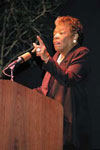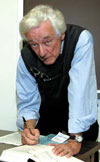| Defining the brand | Advertising the brand | Living the brand |
| Home Forethought President's Message Campus Buzz Feature Stories Re:Search The Score Alum News Yesteryear | ||
 Maya Angelou paid tribute to the “composer” in all of us during her third trip to UT Arlington in February.
Maya Angelou paid tribute to the “composer” in all of us during her third trip to UT Arlington in February.
“We have the opportunity, every day, to help compose someone’s life,” she said, speaking to the possibility of influencing those around us.
The 78-year-old poet, historian, educator and activist took the Texas Hall stage to a standing ovation, then led the 2,000 listeners on a remarkable trip through the human condition.
Taking a cue from her own “composition” prior to the performance—she posed for pictures and mingled backstage with the Texas Hall crew—she added, “Whether it’s a caterer, usher, librarian, teacher or president of the United States, we all have the power to change someone’s life.”
People were moved to tears as Angelou recalled her years as a mute, silenced at age 7 after being raped by her mother’s boyfriend. Her attacker was found dead a day after she revealed who he was. Thinking herself responsible for his death, she entered a world of silence and didn’t exit until six years later.
Angelou had the audience laughing and applauding with personal stories and by reciting her poems “Still I Rise,” “A Brave and Startling Truth” and the Paul Laurence Dunbar work, “A Negro Love Song.” She even spoke in other languages (she is fluent in French, Spanish, Italian, Arabic and West African Fanti).
She joked, danced to illustrate lines in her poems, and often burst into song—in one instance singing about her Uncle Willie, and later doing a song by Roberta Flack.
She encouraged the audience to embrace literature and poetry, reminding everyone to laugh often and remember, “Each of you is a unique and important individual.”
Sponsored by EX.C.E.L. Campus Activities, the event was part of Texas Hall’s 40th anniversary celebration, the Office of Multicultural Affairs’ Black History Month programs and UT Arlington’s weeklong Homecoming observance.
 Some U.S. presidents just don’t understand the job, The New York Times’ former chief political correspondent, nationally syndicated columnist and best-selling author Richard Reeves, said during a February speech in College Hall.
Some U.S. presidents just don’t understand the job, The New York Times’ former chief political correspondent, nationally syndicated columnist and best-selling author Richard Reeves, said during a February speech in College Hall.
“The president’s job is not managing the country. The president’s job is leading the people,” he said. “Abraham Lincoln’s legacy is not agriculture policy; it is leadership.”
Reeves, whose latest book is President Reagan: The Triumph of Imagination, said Reaganism produced a coalition of conservatives bound to rid the nation of “tax-and-spend Democrats.” But Reagan’s presidency produced record federal deficits, which were dwarfed by George H.W. Bush’s deficit and overwhelmed by the George W. Bush deficit. Reeves labeled these administrations “borrow-and-spend Republicans.”
He contrasted the personal styles of past presidents: John Kennedy needed people around all the time; Richard Nixon was a loner. Reeves predicted Reagan’s place in history as “the president who ended the Cold War,” although, he said, the thaw owed more to changes in the Soviet Union than presidential summits.
Neither Jimmy Carter nor Bill Clinton will have a lasting legacy, he predicted. George W. Bush will be assured a chapter in history because of 9-11. But Reeves said Bush’s legacy exceeds his response to terrorism.
“Bush became president when America unquestionably was the world superpower in everything from economics to moral leadership,” he said. “When he leaves, it won’t be.”
Asked to compare Vietnam to Iraq, Reeves said, “One is a jungle; the other isn’t.” He said the absence of a military draft has made the war in Iraq less personal; it has become increasingly privatized, and “too many Americans watch it on television like an NFL game.”
Reeves cautioned against the widespread belief that people all over the world want to be like Americans. “They want what we have; that does not mean they want to be like us.”
He praised the Students for Informed Democracy, which sponsored his lecture, for its international outlook.
“There are members of the United States Congress who actually boast that they do not own a passport,” he said.
— Susan Slupecki and Sue Stevens
| Archives
| Alumni Association |
Giving to UT Arlington | UT
Arlington Home Copyright © 2006 UT Arlington Magazine. All rights reserved. |
